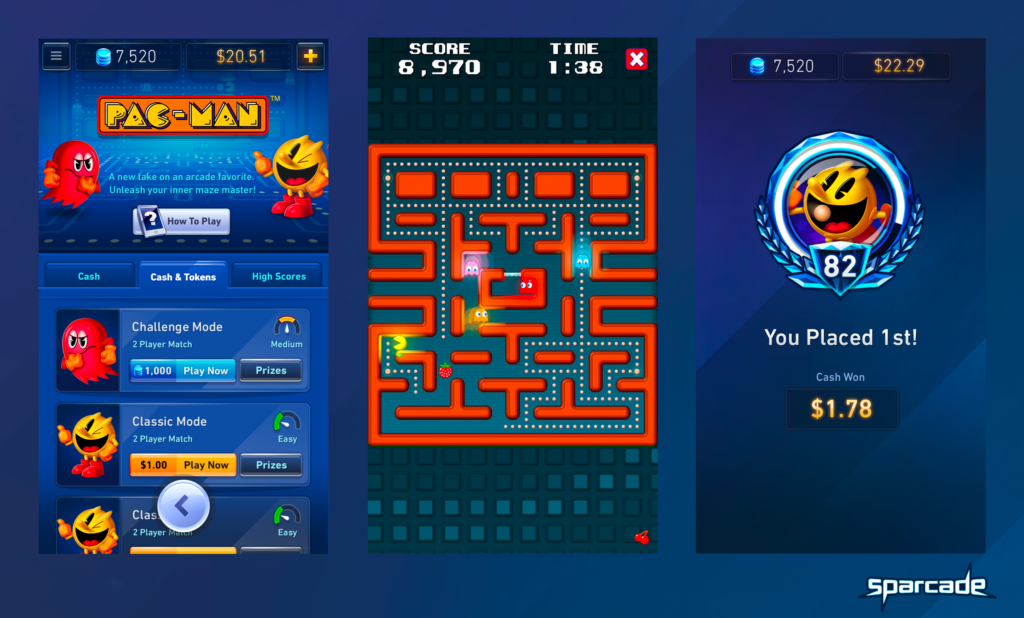GSN Games, which is owned by Sony Pictures Entertainment, has launched the free-to-play Sparcade app on the iOS App Store for iPhone, iPad and iPod touch devices. The app features custom versions of classic games like Pac-Man, Scrabble, Tetris Burst, Solitaire TriPeaks and Wheel of Fortune designed for competitive play. While all of the games are free-to-play against friends and families using tokens, Sparcade has been designed to allow anyone of legal age to bet real money on any competitive match.
Greg Canessa, senior vice president of GSN Games, told [a]listdaily all of these classic games have been designed as “games of skill” so that there’s an even playing field for competition. For example, Tetris Burst offers an asynchronous three-minute tournament where everyone gets the same blocks in same order, whether in a head-to-head match or in a tournament of up to five players.
Maya Rogers, president and CEO of Blue Planet Software, said making Tetris a part of Sparcade, where players can use their skills to compete for cash prizes, really ups the stakes and adds a new level of competition among the Tetris community.
Bandai Namco Entertainment America worked on this version of Pac-Man, which offers a classic mode with four ghosts and a Challenge mode where there are hundreds of map formats, and each tournament gets the same maps in the same order so players can’t them. Players spin the big wheel and compete to solve the same puzzles faster than their opponents for real money in Wheel of Fortune. Scrabble offers a quick session competition where players are given identical boards and letters to work with.
“By launching with games that people already know and love, Sparcade is tapping into the popularity and ubiquity of casual games on mobile as a platform, at the same time the rise of eSports and competition has moved into the zeitgeist of gaming,” Canessa said.
Canessa noted that eSports began with hardcore multiplayer online battle arena (MOBA) games such as Dota 2 and League of Legends and has moved to mid-core titles like Clash Royale, Hearthstone and Vainglory in mobile.
“If you look at mobile games today that are beginning to take a foothold in the world of eSports, the apps serve as the ‘proving ground’ where both casual and competitive players enjoy the games, and from there sprouts organized events and challenges,” Canessa said. “Over time, it is our intention to grow Sparcade in a similar way. We’re laser-focused on building Sparcade as an app with the best names in gaming and a rich meta-game to fuel the community. Once we accomplish this, we know that brands and sponsors will take notice and reach these consumers.”
Canessa believes the initial slate of games have the potential to unlock competitive communities for these franchises that have been passively building up over decades. “In many ways, these games represent the earliest forms of what we consider eSports today,” Canessa said. “Scrabble has a substantial community that plays the physical board game competitively, with leagues, professionals and the North American Scrabble Championship. Tetris has been hosting world championships for years, and Pac-Man has a long history of competitive play and world champions, dating back to the coin-op arcades. So, in many ways, the essence of competition that modern eSports deliver, have been around in some form or fashion for these games for a long time.”
Canessa said partners like Bandai Namco, Hasbro, Tetris Company and others see the long-term potential that Sparcade represents to coalesce competitive communities around their games. To qualify as an eSport, you really need three things: 1) a great game, built for competition from the ground-up, 2) an audience and community willing to watch, and 3) pro players that represent the “best of the best” at what they play.
“We know if we nail the first one, and focus our efforts there, the rest will follow,” Canessa said. “We absolutely see the opportunity here, but we want to take a smart and thoughtful approach to creating an eSports market derived from Sparcade and focus on features that will delight our users and the community, and not spout out buzzwords prematurely and let the cart get ahead of the horse on this.”
Canessa said for a brand or a sponsor, the opportunity is to tap into a community of mainstream players in Sparcade that already have a known frame of reference for competing in these games. “Sparcade broadens the opportunity significantly by enabling players to compete in these games with the mass market, wherever and whenever they’d like,” he said.
The Sparcade app can be played without using real money, including Friend Challenges that offer head-to-head competition. Sparcade offers a metagame that mixes goals and unlockables with social interaction. Completing objectives, like eating 250 ghosts in Pac-Man, will earn players Fame Points, which will unlock special powers to help them earn additional tokens. The tournament gameplay won’t be impacted by power-ups, in order to keep an even playing field.
“With the metagame and social layer offering collectibles, a progression system with achievements earned per game and loot boxes that you open up with different cosmetic and utility value, there’s a lot for fans to engage with,” Canessa said.
Canessa was the creator of Microsoft’s Xbox Live Arcade. Prior to spending the last two years creating Sparcade, he had helped PopCap launch its first mobile games and worked at Blizzard to reboot Battle.net. He also Activision’s mobile division for three years, launching Call of Duty and Skylanders games on iOS and Android.
Canessa said with the launch of Sparcade, GSN is offering players a chance to compete and build their skills in the first wave of games they develop additional more iconic franchises for skill-based play and roll out new features in the future.

